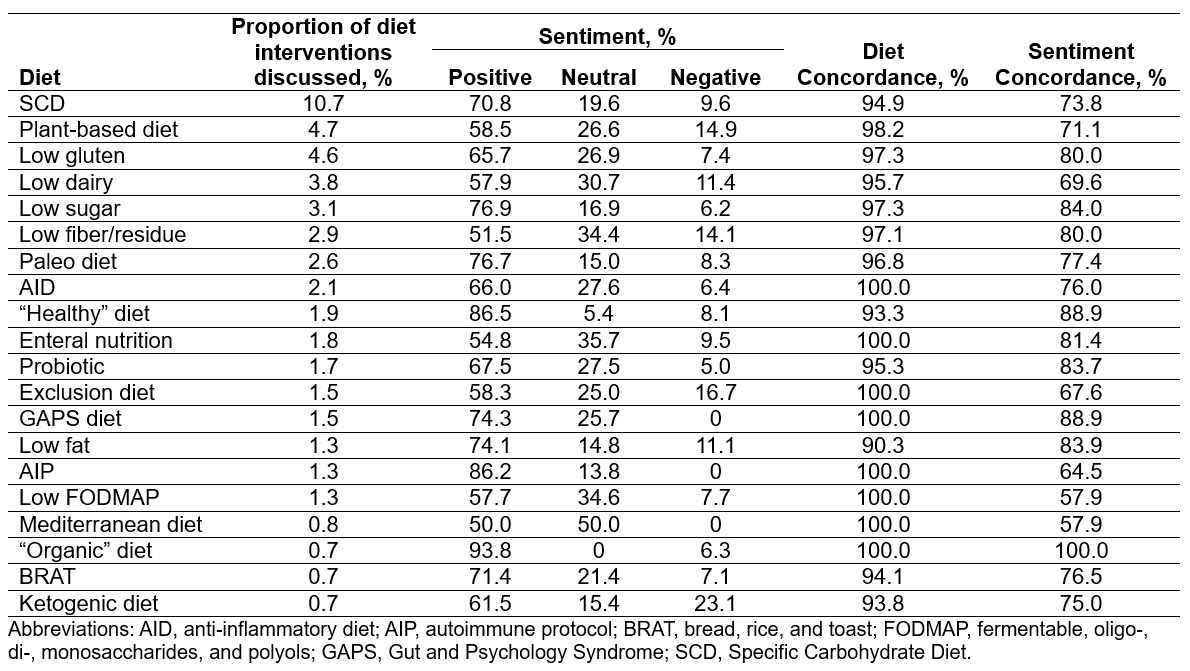Sunday Poster Session
Category: Diet, Nutrition, and Obesity
P0561 - Natural Language Processing to Assess Patient Sentiments Toward Different Diets for Inflammatory Bowel Disease
Sunday, October 26, 2025
3:30 PM - 7:00 PM PDT
Location: Exhibit Hall

Jaden B. Nguyen
David Geffen School of Medicine at UCLA
Palm Desert, CA
Presenting Author(s)
Jaden Nguyen, 1, Maral Daneshpazhouh, BS2, Shruti Ramanand, BS3, Brendan Field, 1, Jia Hui Hai, 1, Angela Minasyan, BS1, Sureya Hussani, MD1, Neha D. Shah, MPH, RD, CNSC, CHES4, Berkeley Limketkai, MD, PhD1
1David Geffen School of Medicine at UCLA, Los Angeles, CA; 2University of California, Los Angeles, Business Bay, Dubai, United Arab Emirates; 3University of California Los Angeles Health, Dublin, CA; 4University of California San Francisco, San Francisco, CA
Introduction: Randomized controlled trials and prospective observational studies have demonstrated the efficacy of several medical nutrition therapies for inflammatory bowel disease (IBD). However, unlike pharmacologic agents, diets are heterogeneous, and corresponding nutrition research has been scarce. A cost-effective approach to explore the benefits and detriments of different diets—and discover new dietary strategies—may be to crowdsource patients’ experiences. The aim of this study was to develop a natural language processing (NLP)-aided system to efficiently identify diets and analyze sentiment in a large volume of patient narratives.
Methods: We retrieved all public posts between January 2011 and April 2025 from the nutrition section of an IBD-focused Internet forum. At least two investigators independently reviewed each post to identify the diet discussed and the poster’s sentiment (positive, neutral, negative). An NLP pipeline was constructed, including tokenization, word/phrase parsing, and integration with a local implementation of the Meta Llama 2 13-billion parameter large language model. The NLP system was instructed to review each post, identify the relevant diet discussed, and assess sentiment, mirroring the investigators. Using investigator-adjudicated labels as ground truth, diet and sentiment concordance (accuracy) were calculated.
Results: Of 2410 posts reviewed, 1254 (52.0%) did not include enough information to identify a particular diet. Mean context length was 570.2 characters with mean processing time of 50.9 seconds. Overall concordance between the NLP system and investigators were 85.7% for diet identification and 76.3% for sentiment assessment. Excluding posts without diet information, concordances were 96.1% for diet and 77.0% for sentiment. The most discussed dietary interventions were the Specific Carbohydrate Diet (SCD), plant-based diets, and low gluten diet with favorability ratings at 70.8%, 58.5%, and 65.7%, respectively (Table). Diets with the highest favorability ratings were the “organic diet”, “healthy diet”, and the autoimmune protocol at 93.8%, 86.5%, and 86.2%, respectively.
Discussion: The NLP-aided system can effectively identify diet interventions and assess sentiment in a large volume of patient narratives. This approach can help assess the relative benefits—or detriments—of diverse dietary strategies in IBD and identify novel diet candidates for systematic investigation and clinical trials in the future.

Figure: Summary of diets discussed, patient sentiment toward diets, and NLP-investigator concordance.
Disclosures:
Jaden Nguyen indicated no relevant financial relationships.
Maral Daneshpazhouh indicated no relevant financial relationships.
Shruti Ramanand indicated no relevant financial relationships.
Brendan Field indicated no relevant financial relationships.
Jia Hui Hai indicated no relevant financial relationships.
Angela Minasyan indicated no relevant financial relationships.
Sureya Hussani indicated no relevant financial relationships.
Neha Shah: GI on Demand – Consultant.
Berkeley Limketkai: Azora Therapeutics – Consultant, Stock-privately held company. Johnson & Johnson – Advisory Committee/Board Member, Speakers Bureau.
Jaden Nguyen, 1, Maral Daneshpazhouh, BS2, Shruti Ramanand, BS3, Brendan Field, 1, Jia Hui Hai, 1, Angela Minasyan, BS1, Sureya Hussani, MD1, Neha D. Shah, MPH, RD, CNSC, CHES4, Berkeley Limketkai, MD, PhD1. P0561 - Natural Language Processing to Assess Patient Sentiments Toward Different Diets for Inflammatory Bowel Disease, ACG 2025 Annual Scientific Meeting Abstracts. Phoenix, AZ: American College of Gastroenterology.
1David Geffen School of Medicine at UCLA, Los Angeles, CA; 2University of California, Los Angeles, Business Bay, Dubai, United Arab Emirates; 3University of California Los Angeles Health, Dublin, CA; 4University of California San Francisco, San Francisco, CA
Introduction: Randomized controlled trials and prospective observational studies have demonstrated the efficacy of several medical nutrition therapies for inflammatory bowel disease (IBD). However, unlike pharmacologic agents, diets are heterogeneous, and corresponding nutrition research has been scarce. A cost-effective approach to explore the benefits and detriments of different diets—and discover new dietary strategies—may be to crowdsource patients’ experiences. The aim of this study was to develop a natural language processing (NLP)-aided system to efficiently identify diets and analyze sentiment in a large volume of patient narratives.
Methods: We retrieved all public posts between January 2011 and April 2025 from the nutrition section of an IBD-focused Internet forum. At least two investigators independently reviewed each post to identify the diet discussed and the poster’s sentiment (positive, neutral, negative). An NLP pipeline was constructed, including tokenization, word/phrase parsing, and integration with a local implementation of the Meta Llama 2 13-billion parameter large language model. The NLP system was instructed to review each post, identify the relevant diet discussed, and assess sentiment, mirroring the investigators. Using investigator-adjudicated labels as ground truth, diet and sentiment concordance (accuracy) were calculated.
Results: Of 2410 posts reviewed, 1254 (52.0%) did not include enough information to identify a particular diet. Mean context length was 570.2 characters with mean processing time of 50.9 seconds. Overall concordance between the NLP system and investigators were 85.7% for diet identification and 76.3% for sentiment assessment. Excluding posts without diet information, concordances were 96.1% for diet and 77.0% for sentiment. The most discussed dietary interventions were the Specific Carbohydrate Diet (SCD), plant-based diets, and low gluten diet with favorability ratings at 70.8%, 58.5%, and 65.7%, respectively (Table). Diets with the highest favorability ratings were the “organic diet”, “healthy diet”, and the autoimmune protocol at 93.8%, 86.5%, and 86.2%, respectively.
Discussion: The NLP-aided system can effectively identify diet interventions and assess sentiment in a large volume of patient narratives. This approach can help assess the relative benefits—or detriments—of diverse dietary strategies in IBD and identify novel diet candidates for systematic investigation and clinical trials in the future.

Figure: Summary of diets discussed, patient sentiment toward diets, and NLP-investigator concordance.
Disclosures:
Jaden Nguyen indicated no relevant financial relationships.
Maral Daneshpazhouh indicated no relevant financial relationships.
Shruti Ramanand indicated no relevant financial relationships.
Brendan Field indicated no relevant financial relationships.
Jia Hui Hai indicated no relevant financial relationships.
Angela Minasyan indicated no relevant financial relationships.
Sureya Hussani indicated no relevant financial relationships.
Neha Shah: GI on Demand – Consultant.
Berkeley Limketkai: Azora Therapeutics – Consultant, Stock-privately held company. Johnson & Johnson – Advisory Committee/Board Member, Speakers Bureau.
Jaden Nguyen, 1, Maral Daneshpazhouh, BS2, Shruti Ramanand, BS3, Brendan Field, 1, Jia Hui Hai, 1, Angela Minasyan, BS1, Sureya Hussani, MD1, Neha D. Shah, MPH, RD, CNSC, CHES4, Berkeley Limketkai, MD, PhD1. P0561 - Natural Language Processing to Assess Patient Sentiments Toward Different Diets for Inflammatory Bowel Disease, ACG 2025 Annual Scientific Meeting Abstracts. Phoenix, AZ: American College of Gastroenterology.

